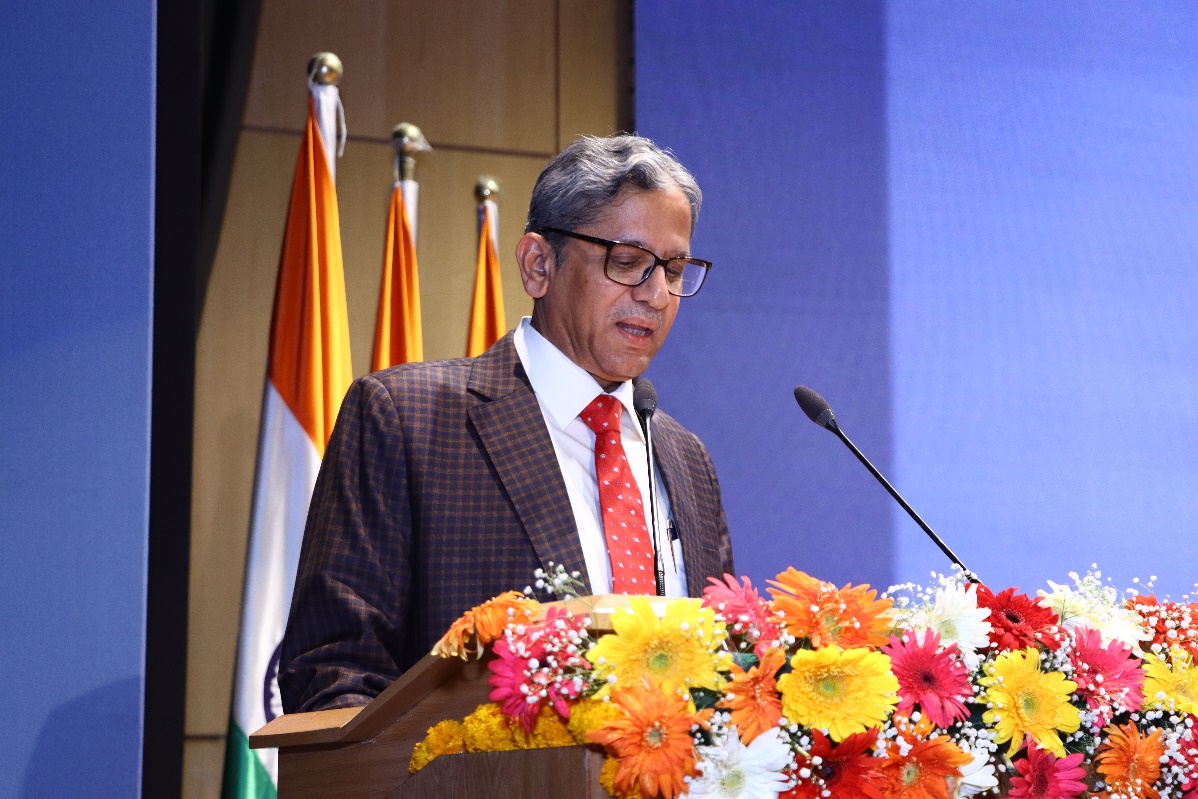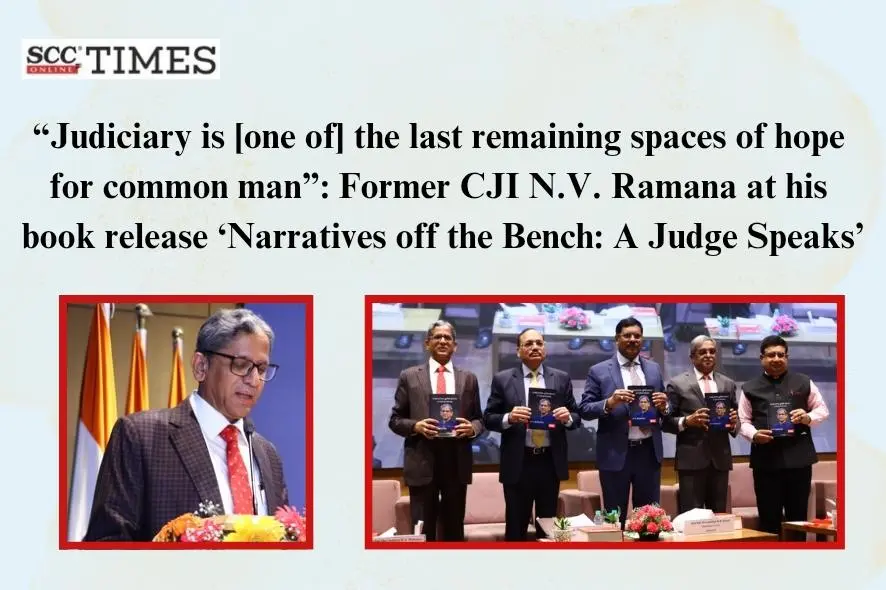Celebrating the release of Former CJI Justice N.V. Ramana’s book titled ‘Narratives off the Bench: A Judge Speaks’, EBC organised a book release event at the Delhi High Court. In this insightful work, Justice Ramana emphasises the crucial need to bridge the disconnect between the common man and the judiciary, with the aim to empower justice seekers, enlightening them about their Constitutional rights and duties, India’s rich democratic values, and the sanctity of our institutions.
The event was graced by Justice B.R. Gavai, Chief Justice of India-Designate, as the chief guest and guests of honour, namely, Justice Surya Kant and Justice Vikram Nath, Supreme Court of India, and was well-attended, drawing over 400 participants, including judges from the Supreme Court, Delhi High Court, Telangana High Court, Andhra Pradesh High Court, Allahabad High Court, and Madhya Pradesh High Court and other prominent legal luminaries.
Welcoming the audience and guests, especially the various sitting and retired judges of High Courts and the Supreme Court, Justice N.V. Ramana expressed his gratitude for the presence of the attendees. He also expressed his appreciation for the touching statements and sentiments expressed by his brother judges in their addresses.

On a lighter note, he pointed towards the program invite and remarked that normally judges are known to be aloof from emotions, but he was glad to see a rare glimpse of his brother cheerfully and generously smiling in the invite.
Reminiscing about an interaction with Justice Gavai, he spoke about how in the half-hour meeting, Justice Gavai spoke about Tirupati Balaji, issues faced by High Courts, and by first-generation advocates who came from rural backgrounds, but did not attempt to speak about his elevation, directly or indirectly. Justice Ramana commended Justice Gavai for taking a brave and committed stand with the principles of the Constitution and speaking openly, thereby proving his worth to become the next Chief Justice of India.
Speaking about the book, Justice Ramana stated that this book was neither a memoir nor a commentary on legal doctrines; rather, it was a collection of his thoughts that he had expressed through his various speeches delivered at public platforms as the CJI. He underscored that these thoughts took shape slowly, over years of observation, reflection, and inner dialogue. The book crystallizes his experiences as a student leader, trade union activist, journalist, lawyer, and judge into words.
“The judiciary is not a mere adjudicator of disputes. It is a symbol of constitutional morality. It is one of the last remaining spaces of hope for the common man.”
He further remarked that though the media reported on court proceedings and the judiciary regularly, in public discourse, the judiciary remained an enigma, unlike politics. Due to this, he endeavoured, through his speeches, to communicate with the public about the judiciary with the hope of demystifying various misnomers.
Outlining the systemic issues such as, the Indianisation of the judiciary, revamping of the judicial infrastructure, diversity in the judicial system, integrating Indian languages into Court proceedings, strengthening legal aid, etc., Justice Ramana opined that these were not mere administrative concerns but rather fundamental to the promise of access to qualitative justice. He further highlighted that the judiciary had ventured into solving these issues and experienced some success in aspects such as increased digitisation, strengthening legal aid services, improving service and security conditions of judicial officers, etc. However, the creation of the National Judicial Infrastructure Authority remained a distant dream. In this regard, he expressed his belief that this book would present itself as a cautious hope that our institutions were resilient and capable of reform.
Expressing his honour for the presence of Justice Gavai, Justice Kant, and Justice Nath, he remarked that they had not only shared the bench with him but also lived through many moments of quiet solidarity, warm camaraderie, and active collaboration to find solutions.
Illustrating how the judiciary functioned during the COVID-19 pandemic, he stated that this book reflected the ethos that the judiciary shared, which aided them in remaining focused on humanism.
Speaking on Justice Gavai’s designation as the 52nd CJI, Justice Ramana commended the humility, empathy, and vision that Justice Gavai would bring to the role. He remarked that Justice Gavai will add a much-needed dimension informed by his rich experience and humble background to the justice delivery system. Commenting that it was our experiences that shape our views and opinions, he expressed the hope that Justice Gavai’s leadership will give momentum to the endeavour of ensuring social diversity on the Bench.
About the judicial system, Justice Ramana remarked, “When the rank and file of the judiciary are assured that the highest judicial institution stands firm to safeguard their rights and redress their [judges’] grievances, they are less likely to seek support from other sources such as political and executive powers.” He added that as the elder brothers and sisters in the judicial family, the Judges of the Supreme Court had the moral and institutional duty to look after all the judges. The Supreme Court must ensure that the judges feel supported and secure in their roles. The higher judiciary must lead with care and compassion while nurturing a judicial culture rooted in dignity, integrity, and solidarity.
Addressing the legal fraternity, he appreciated their relentless passion and participation in shaping the Indian judiciary and jurisprudence. An active Bar is the first line of defence against injustice. It is also the last bastion that must speak truth to power in testing times. He remarked that the judiciary thrived and survived only on people’s faith, and unwarranted attacks on this institution affect the foundation of people’s trust. Thus, he requested the bar to continue playing its role in preserving and promoting the judiciary as an institution of hope. Justice Ramana also expressed his hope that the judiciary will continue to navigate through storms with courage, reinforcing its role as the guardian of rights and liberties.
Lastly, he thanked Justice Devendra Kumar Upadhyaya, Chief Justice of the Delhi High Court and Justice Pratibha M. Singh, Chairperson of the Delhi High Court Building Committee for their cooperation, EBC’s publishing and editorial teams, officers of the High Courts and Supreme Courts who had assisted him, his law clerks and office staff over the years, his family and friends, and the audience.
In conclusion, he hoped that this book would provoke some thoughts, inspire young lawyers, and guide the common citizen.
“If it sparks even a small conversation on the judiciary, I would consider it a welcome bonus.”


